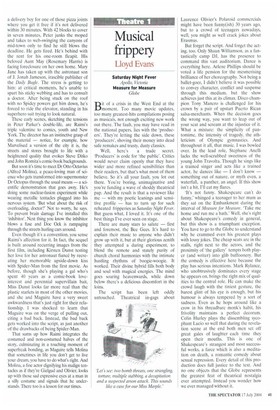Musical frippery
Lloyd Evans
Saturday Night Fever Apollo, Victoria Measure for Measure Globe
D it of a crisis in the West End at the L./moment. Too many movie updates, too many greatest-hits compilations posing as musicals, not enough exciting new work out there. The fault, you may have read in the national papers, lies with the 'producers'. They're letting the side down, these 'producers', shoving their money into dead safe remakes and trusty, dusty classics.
Well, here's a trade secret. 'Producers' is code for 'the public'. Critics would never claim openly that they have wider and more refined sensibilities than their readers, but that's what most of them believe. So it's all your fault, you lot out there. You're boring, unimaginative and you're funding a wave of shoddy theatrical pap. And the result is that a reviewer like me — with my poetic leanings and sensitive profile — has to turn up for such reheated fripperies as Saturday Night Fever. But guess what, I loved it. It's one of the best things I've ever seen on stage.
There are many stars to salute — first and foremost, the Bee Gees. It's hard to explain their music to anyone who didn't grow up with it, but at their glorious zenith they attempted a daring experiment, to blend the remote and stately purity of church choral harmonies with the intimate hustling rhythms of boogie-woogie. It worked. Their divine hybrid fills both body and soul with magical energies. The mind goes soaring heavenwards, while down below there's a delicious discomfort in the loins.
The script has been left oddly untouched. Theatrical in-gags about Laurence Olivier's Polaroid commercials might have been funny(ish) 30 years ago, but to a crowd of teenagers nowadays, well, you might as well crack jokes about Erasmus.
But forget the script. And forget the acting. too. Only Shaun Williamson, as a fantastically camp DJ, has the presence to command this vast auditorium. Dance is everything here. Arlene Phillips should be voted a life pension for the mesmerising brilliance of her choreography. Not being a ballet-goer, I didn't believe it was possible to convey character, conflict and suspense through this medium, but the show achieves just this at its climax. Disco champion Tony Manero is challenged for his crown by a pair of upstart Puerto Rican salsa-merchants. When the decision goes the wrong way, you want to leap out of your seat and scream at the injustice of it. What a mixture: the simplicity of pantomime, the intensity of tragedy, the athleticism of Olympic gymnastics. And throughout it all, that music. I was bowled over. In the lead role, Stephane Anelli lacks the well-scrubbed sweetness of the young John Travolta. Though he sings like a trained singer and acts like a trained actor, he dances like — I don't know — something out of nature, or myth even, a waterfall, a panther, an angel. If this show isn't a hit, I'll eat my flares.
'It's not funny. Shakespeare can't do funny,' whinged a teenager to her mum as they sat on the Embankment during the interval of Measure for Measure, 'Take me home and run me a bath.' Well, she's right about Shakespeare's comedy in general, but this show is a triumphant exception. You have to go to the Globe to understand why he crammed even his greatest plays with lousy jokes. The cheap seats are in the stalls, right next to the actors, and the proximity of 'the gallery' tempts both player (and writer) into glib buffoonery. But the comedy is effective here because the play has serious intentions. Mark Rylance, who unobtrusively dominates every stage he appears on, brings the right mix of qualities to the central role. He can make the crowd laugh with the tiniest gesture, the barest glint of his eye is enough, but his humour is always tempered by a sort of sadness. Even as he hops around like a crow in his threadbare monk's habit, his frivolity maintains a perfect decorum. Colin Hurley plays the dissembling sycophant Lucio so well that during the revelation scene at the end both men set off great gales of laughter each time they open their mouths. This is one of Shakespeare's strangest and most successful works, a farce which is also a meditation on death, a romantic comedy about sexual repression. Every detail of this production does full justice to the text. And no one objects that the Globe represents the greatest feat of theatrical nostalgia ever attempted. Instead you wonder how we ever managed without it.


























































 Previous page
Previous page